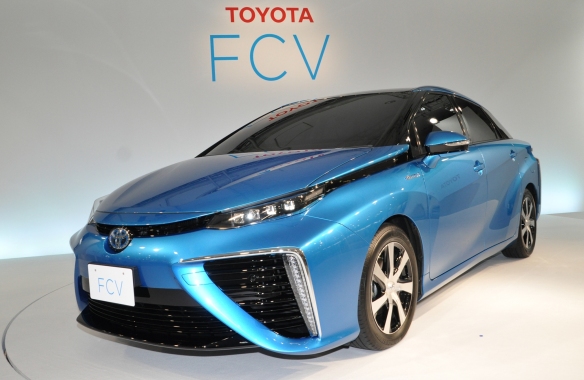Toyota has finally realized its dream to develop the car of the future, after 20 years of sincere dedication. The Toyota FCV is a hybrid hydrogen fuel cell vehicle and will be the world’s first hydrogen FCV to be sold commercially. The car is called “Mirai”, a Japanese term for “future”.

A Fuel Cell Vehicle is equipped with a “Fuel Cell” in which electricity is generated through chemical reaction between hydrogen and oxygen to power the motor. As a gasoline substitute for fuel, Toyota has chosen hydrogen. Hydrogen is environment-friendly and according to Toyota, the gas will be the most sustainable option in the near future as it can be produced from renewable energy sources; solar and wind and also because from the tailpipe only water vapor is emitted as exhaust. Hybrid vehicle core technology has been used by Toyota to develop this vehicle.
The yet to be named sedan will go on sale in Japan by next April, with a launch in the U.S. and Europe by the summer 2015. Toyota previewed the sedan as a concept car at the Toyota Motor Show, almost a year back.
As an alternative fuel, hydrogen has greater capacity. It is easy to store up and transfer and when compressed has higher energy density in comparison to batteries. Beyond automobiles, hydrogen is used for much wider applications, for instance large-scale power generation.
The new Toyota Fuel Cell sedan comes with the seating capacity of four adults, driving range in comparable with a petrol engine vehicle and can be refueled within three minutes. The sedan provides smooth and silent drive and emits zero CO2 during operation. For over long distances FCV is beneficial over Electric Vehicles, because of the high energy density of hydrogen, even if the tank capacity of an FCV is increased, the cost does not vary greatly as it would in case of EV.
This Front-Wheel Drive vehicle is designed to offer practical transportation. The front compartment comprises the electric motor, electronic control system and boost converter. The FCV is powered with a small, light-weight FC stack and two high-pressure hydrogen tanks of 70MPa, which are placed under the sedan’s unique body.
Toyota said that the new sedan will get to 60MPG in around 10 seconds and the completely fueled FCV can drive around 300 miles without refueling. The concept of the FCV is inspired by catamaran and its size will be in accordance with the size of Toyota’s Camry.
General Motors will give tough competition to Toyota, as GM has a wide array of hydrogen fuel-cell vehicles and is working with Honda to increase the pace of development of hydrogen fuel-cell power-train technology. For release, GM has given 2015-2020 as the time frame.
Toyota will also face challenges in developing of hydrogen fueling station. Japan has only a dozen of the station while California being the only US state is investing money to develop sufficient fuel stations to support around 10,000 vehicles. The Japanese government has announced to invest money to develop around 100 stations by March 2015.
Toyota is a dominant player in the field of automobile industry and has taken massive steps in order to develop the vehicles that are environment friendly. Toyota’s concept of vehicle manufacturing depends upon three following principles: “embracing diverse energy sources; securing low vehicle emissions; and driving positive environmental change by making
these vehicles popular with customers.”
Keep visiting, to catch up more regarding the car of the ‘future’.

No comments:
Post a Comment